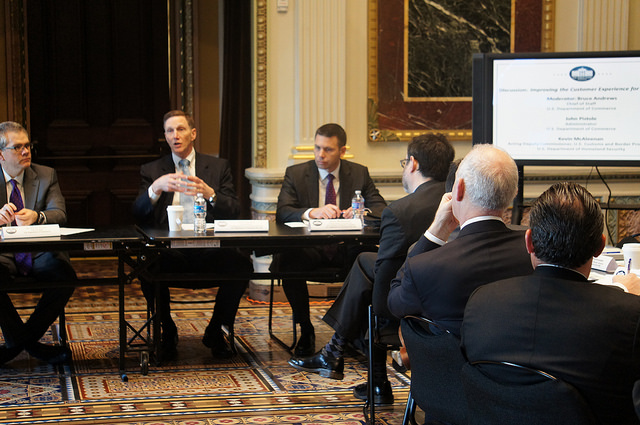White House Business Council Briefing on Travel & Tourism
Last week I participated in the White House Business Council briefing on travel and tourism in the U.S. Administration officials gave an update on the economy and discussed how the U.S. Department of Homeland Security and other Agencies work to promote travel and tourism from, to and within the United States. The meeting was an opportunity for the industry to be face to face with administration officials (business travel professionals understand how important that is!) and share encouragement and concerns on policies effecting travel.
The day started in typical DC fashion – with no parking available near the White House – I called a cab. It was late and therefore I was behind schedule. One day I will remember what my friends who work for the limousine association tell me – call for a black car! Arriving late for a meeting at the White House/Old Executive Building is not a good feeling. To make matters worse the security process is complicated and a little confusing even to a pro. Waiting in line to check our badges and ID, I went to the first officer that was available. He told me he couldn’t help me. Confused I stepped back in line. He then called me back up and said I had to say “Go Blue.” I realized I was wearing my Ohio State tie since they were playing at noon, and he was clearly a fan of my school’s biggest rival. I said absolutely not, he jokingly said he would arrest me and then waived me through.
The meeting began with a briefing from David Langdon, Senior Policy Advisor for Economics and Statistics, Department of Commerce. He covered the impact travel has had on the economy. U.S travel and tourism generated $1.5 trillion in economic output and created 7.8 million jobs. It is heartening to know that Administration officials acknowledge the impact travel has on the overall economy.
The next speakers were those of most interest to me, Department of Homeland Security Deputy Secretary Alejandro Mayorkas, Transportation Security Administration Administrator John Pistole and Acting Deputy Commissioner Kevin McAleenan of Customs and Border Protection.

The Deputy Secretary vowed to make DHS more open, engaged and transparent. He proposed DHS utilize industry knowledge through the “Shared Executive” program. This prompted the audience to come up with several ideas from marketing, to line management to better interaction with incoming travelers.
Administrator Pistole spoke at length on TSA’s PreCheck program. This was prompted by the moderator saying he had just learned of it, enrolled and loved it. I am still astounded that a DC insider is just finding out about the program. DHS clearly needs private industry marketing advice! Administrator Pistole said that 100,000 people have signed up with the PreCheck Application and more than 90 million travelers have gone through some sort of expedited screening. However, he knows that isn’t enough and is pushing his team to expand and do better.
The question on our minds, which we asked because we are concerned it is hurting the PreCheck enrollment, was how long will managed inclusion continue (the practice of observing travelers behavior and allowing those who appear to not be a threat into the PreCheck lanes ). The Administrator was a little cagey in the response, but the answer seems to be that as enrollment for PreCheck increases, then managed inclusion will decrease.
Acting Deputy Commissioner McAleenan discussed the expansion of pre-screening facilities as a way to facilitate greater in bound travel. He also discussed the use of “trusted traveler” programs, including Global Entry. I raised the issue of lack of clarity on how travelers can take advantage of the reciprocal agreements as well as the status of the APEC Card. He said an update on APEC will be coming soon! And we are setting a meeting to further discuss the usage of other countries expedited screening programs and vice versa.

The meeting continued from there with discussions on travel promotion, infrastructure and national parks.
The meeting was encouraging in that very smart, powerful people understand and appreciate the impact travel has on the United States and the world. They are just looking to us as an industry to help provide the answers. And we are just the ones to do it!
